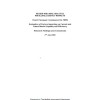Today IPPR released its latest overview of its European jobs and skills market report which was done in collaboration with The JPMorgan Chase New Skills at Work programme.
The report found that Europe continues to face significant challenges when tackling unemployment underemployment and inactivity. The effect of the recession is still being felt in many economies across Europe, with the erosion of many economies skills base which is vital for medium to long run economic growth.
Within this the report also highlights the contrast between different groups of individuals. For example:
- The young needed enhanced support to transfer from an educational position to one of employment
More attention - Improving vocational training
- Existing workers also need greater support to continually upgrade their skills
- Supporting female participation in the labour market.
The key challenges they identified are:
- Tackling the unemployment rate
- Fighting youth unemployment
- Boosting the activity rate
- Strengthening education outcomes
- Growing productivity
- Increasing vocational education and training opportunities
Link to report:
To read the report in full please click here


